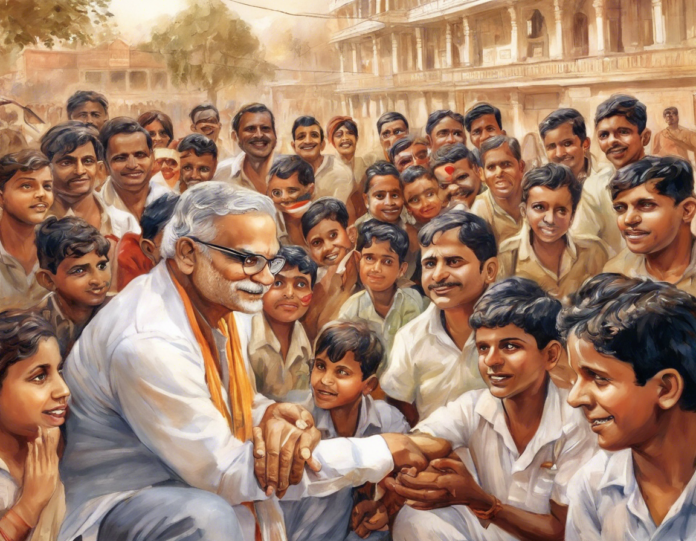Bharat Ka Samvidhan: Key Points to Remember
India, a country known for its diverse culture and rich history, is governed by the Constitution of India, also known as Bharat Ka Samvidhan. Adopted on 26th November 1949, the Indian Constitution came into effect on 26th January 1950, marking the birth of the Republic of India. The Constitution of India is the longest written constitution of any sovereign country in the world, consisting of a preamble and 448 articles, divided into 25 parts.
Preamble of the Indian Constitution
The Preamble serves as an introduction to the Constitution and reflects the ideals and aspirations of the people of India. It declares India to be a sovereign, socialist, secular, and democratic republic and promises justice, liberty, equality, and fraternity to all citizens.
Fundamental Rights
Fundamental Rights, enshrined in Part III of the Constitution, are rights guaranteed to every citizen of India to ensure social equality and justice. These rights include the right to equality, right to freedom, right against exploitation, right to freedom of religion, cultural and educational rights, and right to constitutional remedies.
Directive Principles of State Policy
Directive Principles of State Policy in Part IV of the Constitution provide guidelines for the government to establish an egalitarian society. While not enforceable by courts, they are fundamental in the governance of the country and aim to promote the welfare of the people by ensuring social justice, economic welfare, and individual liberty.
President, Parliament, and Judiciary
The Constitution of India establishes a parliamentary system of government where the President is the head of state, the Parliament is the legislative body, and the Judiciary acts as the guardian of the Constitution. The President is the ceremonial head of state, the Parliament consists of the President and two houses – the Lok Sabha (House of the People) and the Rajya Sabha (Council of States), and the Judiciary interprets the laws and safeguards the rights of the citizens.
Amendment Procedure
The Constitution of India provides for its amendment to adapt to changing circumstances and needs. An amendment can be initiated by either house of Parliament and must be passed by a two-thirds majority. Some amendments require ratification by at least half the state legislatures.
Emergency Provisions
The Constitution of India allows for the declaration of three types of emergencies – national emergency, state emergency, and financial emergency. During an emergency, the central government gains additional powers to address the situation effectively.
Important Articles
Certain articles in the Constitution hold particular significance due to their provisions. Some of these include Article 14 (Right to Equality), Article 19 (Right to Freedom), Article 21 (Right to Life and Personal Liberty), Article 32 (Right to Constitutional Remedies), and Article 370 (Special status to Jammu and Kashmir).
Federal Structure
India has a federal form of government where the powers are divided between the central government and the state governments. The Constitution defines the powers and responsibilities of both levels of government to prevent encroachment on each other’s domain.
Election Commission of India
The Constitution establishes the Election Commission of India to conduct free and fair elections at all levels of government. The Election Commission ensures that the electoral process is conducted fairly and without any bias.
Judicial Review
The Indian Judiciary has the power of judicial review to ensure that laws passed by the legislature adhere to the provisions of the Constitution. This power enables the Judiciary to strike down any law that is found to be unconstitutional.
Unity in Diversity
One of the core principles of the Indian Constitution is the concept of unity in diversity. India’s diverse culture, languages, religions, and traditions are respected and upheld by the Constitution, promoting harmony among its people.
Frequently Asked Questions (FAQs)
1. Why is the Indian Constitution considered a living document?
The Indian Constitution is considered a living document because it can be amended to reflect the changing needs of society and to address emerging issues. This flexibility ensures that the Constitution remains relevant and responsive to the evolving landscape.
2. What is the significance of the Fundamental Rights in the Indian Constitution?
Fundamental Rights are essential safeguards that protect the individual liberties and freedoms of citizens. They ensure that all individuals are treated equally under the law and have the right to dignity and justice.
3. How do Directive Principles of State Policy differ from Fundamental Rights?
While Fundamental Rights are enforceable by courts and are binding, Directive Principles of State Policy are non-justiciable and provide guidelines to the government on policy matters. They aim to promote the welfare of the people and establish a just and egalitarian society.
4. What is the role of the President in the Indian parliamentary system?
The President in the Indian parliamentary system is the head of state, representing the unity of the nation. While largely a ceremonial role, the President performs certain important functions such as the appointment of the Prime Minister and key officials.
5. How does the Indian Judiciary protect the rights of citizens?
The Indian Judiciary interprets the laws and the Constitution, ensuring that the rights of citizens are upheld. Through the power of judicial review, the Judiciary can strike down any law or action that is found to be unconstitutional.
In conclusion, the Constitution of India, Bharat Ka Samvidhan, is the cornerstone of Indian democracy, providing a framework for governance, protecting the rights of citizens, and promoting social justice. Understanding the key points of the Indian Constitution is essential for every citizen to appreciate the foundational principles on which the country is built.






